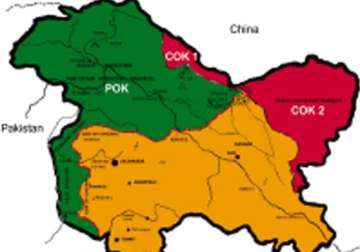Muzaffarabad, PoK, Jun 23: In Pak Occupied Kashmir, local traders are hoping that the India-Pak foreign secretaries' talks will include a solution on trade restrictions that have suspended their business for months.
Tariq Mahmood Wani, Vice President of Jammu and Kashmir's joint Chamber of Commerce believed India's decision to impose Value Added Tax on imports from Pak Occupied Kashmir has affected the business in the region, forcing strikes in both parts of Kashmir.
“I think instead of relief this has killed our economy... The governments of Pakistan and India haven't helped us at all during the last two and a half years, we are at the point where we were on 21st of October (2009),” he said, while visiting the wholesale market in Muzaffarabad.
Apart from trade, Kashmir residents are hopeful the restrictions on the movement between the two Indian and Pakistani administrated areas will be addressed in the talks as well.
Mohammad Riaz, who migrated with his family from Indian-administrated Kashmir to Pakistani-controlled area, says it's “painful and difficult to live lonely and far away without parents, brothers and sisters and relatives.”
“But we are surviving,” he said, adding that the talks should focus on Kashmir dispute rather than other topics.
India wants Pakistan to show it is serious about reining in militants who operate out of Pakistani territory.
India blames the Pakistan-based militant group Lashkar-e-Taiba for carrying out the 2008 Mumbai attacks, in which 10 gunmen rampaged through city landmarks, killing 166 people.
In Muzaffarabad, comments by Mulana Abdul Aziz Alvi, Head of Jamaat-Ud-Dawa, a banned militant organisation which was allegedly connected with the Mumbai attacks, go along with India's concerns.
“The only solution” of the Kashmir dispute is “jihad,” he said.
Jamaat-ud-Dawa emerged after Pakistan's government banned Lashkar-e-Taiba in 2002, following US pressure.
The group, which denies any links to Lashkar, runs a chain of schools and medical clinics and has helped survivors of two deadly earthquakes in recent years.
Pakistan, on the other hand, wants an early settlement of its dispute with India over Kashmir, which lies at the heart of hostilities between the countries and was the trigger of two of their three wars.
The proposed talks have raised hopes of peace in the Kashmir valley though few expect dramatic results for the resolution of the long-standing dispute .
India is going ahead with the talks despite revelations made by a Pakistani-American in a trial in Chicago last week that Pakistani intelligence was involved in plotting and funding the Mumbai attacks. Islamabad denies the charge.
Last month, Indian and Pakistani defence secretaries met in Delhi and agreed to continue working to reduce tension on Siachen glacier where gruelling conditions have killed more troops than hostile fire. AP
Latest World News
